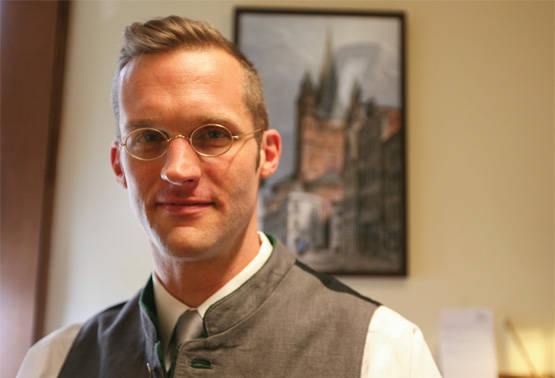Beware of Minimum Requirements: They Just Might Change Your Life

As a student at Vassar, I pursued a major in music with a concentration in composition. While the college prides itself on its flexible curriculum that allows students to build a diverse course of study, there were a small number of requirements that must be met, including “proven proficiency in a language other than English.” Having earned excellent grades in high school French—which I took because I had to—I considered trying to test-out of Vassar’s language requirement, but for students of music, knowledge of German was (and still is) “strongly recommended.” Rolling my eyes, I enrolled in an intensive introductory German course, just to get it over with, but instead I found myself forever changed.
Professor Günter Klabes, who taught at Vassar from 1974-2010, was an engaging teacher. Energetic and possessing a gleaming nutcracker’s grin, he conveyed the beauty of the German language even to his bumbling intro students. His teaching was rife with humor and an infectious passion for German art and literature, as well as the more mundane glories of his homeland—German wine among them. I was so taken with the study of German that I would complete a correlate sequence in the subject in just two years. The process of learning German, and learning it well (Dankeschön, Herr Klabes!), allowed me to access a wealth of literature while fueling an interest in international affairs and world history. And, quite unexpectedly, it afforded me the chance to discover long-forgotten facets of my family’s heritage.
During the summer of 1996, I participated in Vassar’s six-week Summer Study Program in Münster, Germany (established by Professor Klabes in 1975). It was to be one of my first extended trips to another country. I would return to the United States in awe of the stark differences, as well as the similarities, between the people and cultures of the two nations. And for the first time in my short life, I understood why my relatives chose the professions they did, why they decorated their homes the way they did, why they ate and drank what they did. I vowed to return to Germany for a longer stay, and did so after graduation by moving to Cologne with the support of a fellowship through the Congress-Bundestag Youth Exchange for Young Professionals.
The end of my fellowship year happened to coincide with a German relative’s retirement project: In the final stages of researching his own family tree, my distant cousin Albert Feulner had tracked down my German-born great-aunt, Gertrude Knight (née Hohenberger), who was happy to tell him that I—one leaf on his family tree—was now just a short train ride away. A few weeks later, I was headed out from the Rhineland metropolis of Cologne to a hamlet in Bavaria’s Franconian Forest called Enchenreuth.
With cousin Albert and his wife, Ingrid, as my guides, I saw the church where my paternal great-grandparents were married and the attic bedroom in which my Aunt Gertrude was born. I saw what remained of the sawmill where my ancestors labored to process the region’s abundant timber. I joined the entire village in their funeral procession for a fallen resident, during which an elderly woman recalled for me the day my great-grandfather left the village. (“We Germans,” he is believed to have said, “will start another war, and I do not wish to be here to see it.”) She was four times my age, half my height, and—as I learned as her eyes welled with tears—one of my Aunt Gertrude’s childhood friends.
On my final night in Enchenreuth, under an American flag displayed in my honor alongside the German colors, I celebrated the summer solstice with complete strangers who embraced me fully, as family and as a friend.
That visit to my family’s ancestral village brought to a close a year in Germany that counts among the best of my past 37 on this planet. Moreover, it marked a milestone in a process of discovery that began with conjugation drills in Vassar’s Chicago Hall and continues to enrich my life in countless ways. By heeding the college’s expectation that I gain “proficiency in a language other than English,” I ultimately gained a new sense of belonging—roots, if you will—in a village and a city, another country, and the world.
